The Future of Sports Apps Marketing in 2026: What to Expect Next






The 2024 mobile market thrives on technological innovation, diverse consumer spend, and a focus on privacy, with video content and mobile commerce leading growth.

As the digital age progresses, the mobile market continues to evolve at an unprecedented rate. In 2024, we stand at a pivotal moment where consumer habits and technological advancements intersect to redefine the mobile landscape.
The year 2023 marked a significant uptick in the time consumers dedicated to mobile applications. With an average daily usage surpassing 5 hours across the top 10 markets, a 6% increase from the previous year, the trend is clear: mobile apps are becoming integral to daily life.
Indonesia leads the pack with over 6 hours of usage, while other countries such as Thailand and Brazil are not far behind. This surge is mirrored in developed nations like Japan, Australia, and Canada, where the growth rates are 18%, 16%, and 16% respectively.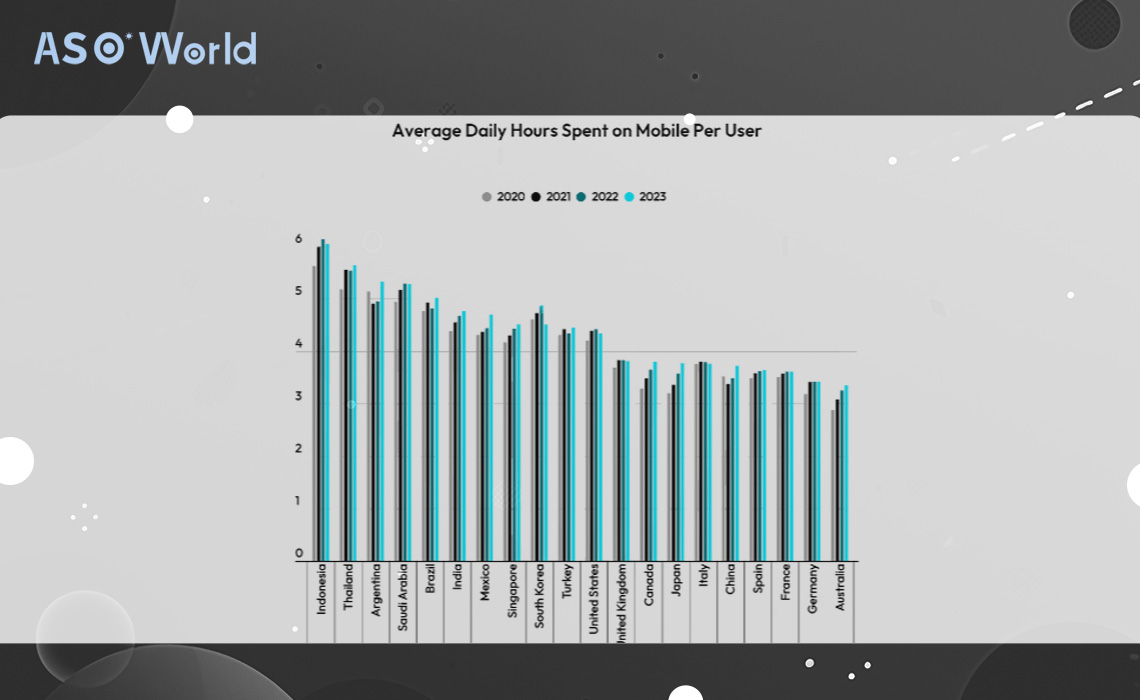
After a slight dip in 2022, global consumer spend within the mobile space has bounced back, growing by 3% in 2023. This rebound is particularly strong in markets like South Korea, Brazil, Mexico, and Turkey, all of which have seen over 25% year-over-year growth. Despite a stagnation in download growth at 1%, countries like Bangladesh are emerging as fast-growing markets, signaling a shift in user acquisition dynamics.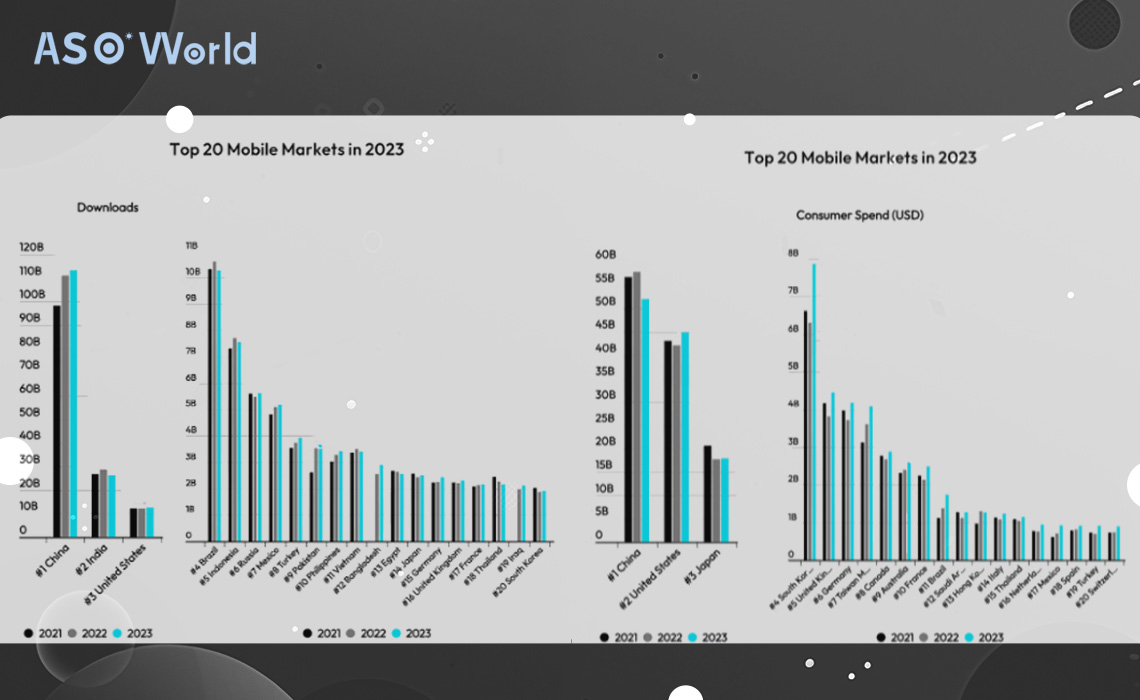
With a forecasted ad spend exceeding $400 billion in 2024, mobile is poised to claim an even larger slice of the advertising budget pie. The focus on mobile is a direct response to the increasing amount of time consumers spend in apps, with total hours reaching a staggering 5.1 trillion in 2022 on Android devices alone. Although ad spend growth is recovering from a slower pace in 2023, it still lags behind the growth rates experienced from 2019 to 2022.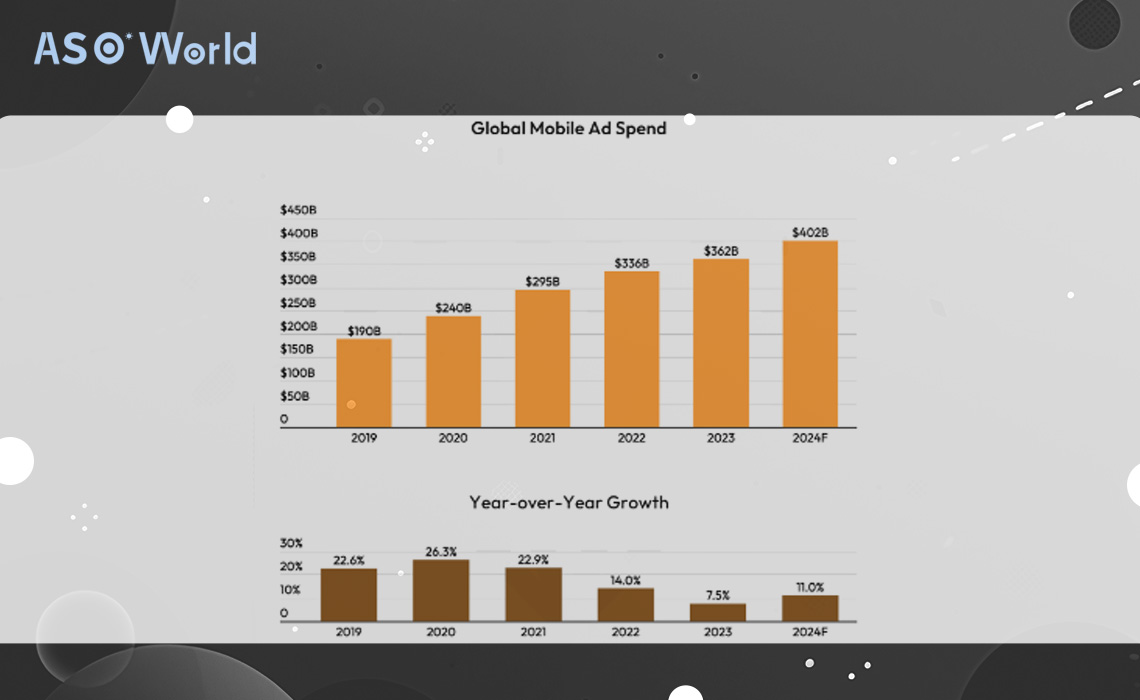
Platforms like YouTube and TikTok are capturing more of the consumer's attention, outperforming other social networks in terms of average time spent. This trend underscores the potential of video content as a key strategy for engaging audiences in the mobile domain.
While gaming app spend has traditionally been linked to disposable income levels and saw a decline in 2022 and 2023, non-gaming apps have displayed remarkable resilience. These apps are increasingly perceived as 'need-to-have' services, akin to traditional utilities. As mobile payment comfort grows, so does consumer willingness to invest in these services, with spending in apps excluding games reaching over $60 billion in 2023.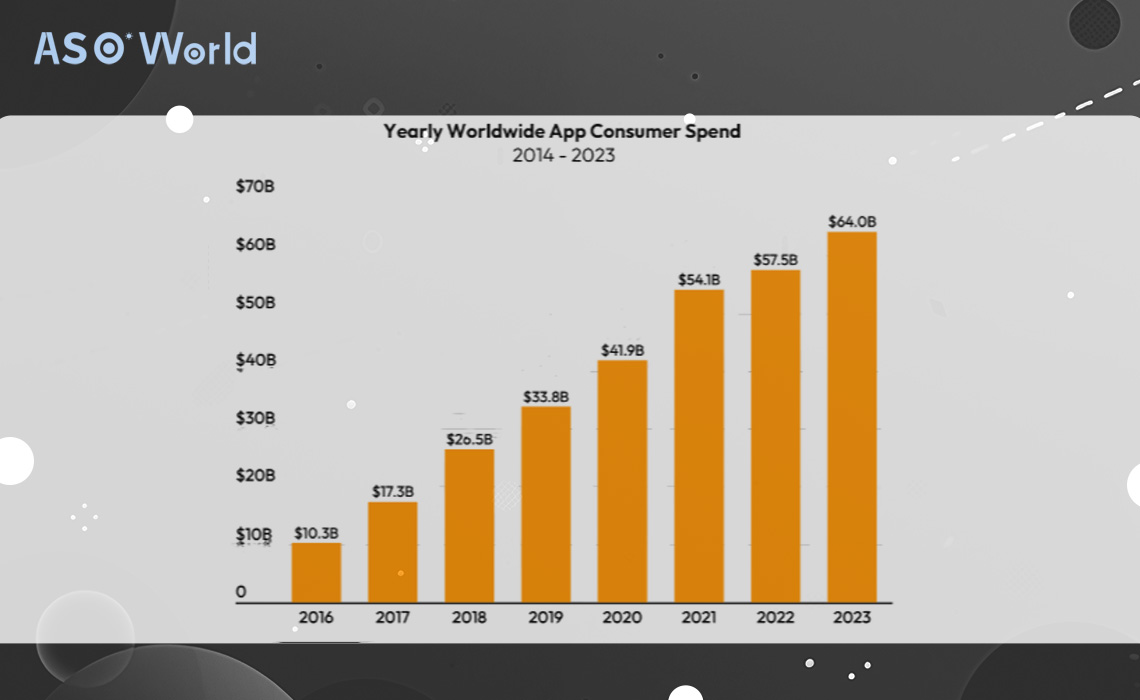
The diversification in consumer spend is evident, with entertainment, social media, and utility & productivity apps leading the growth in 2023. Each app genre saw year-over-year growth, reflecting the broadening appeal of mobile apps across various consumer needs.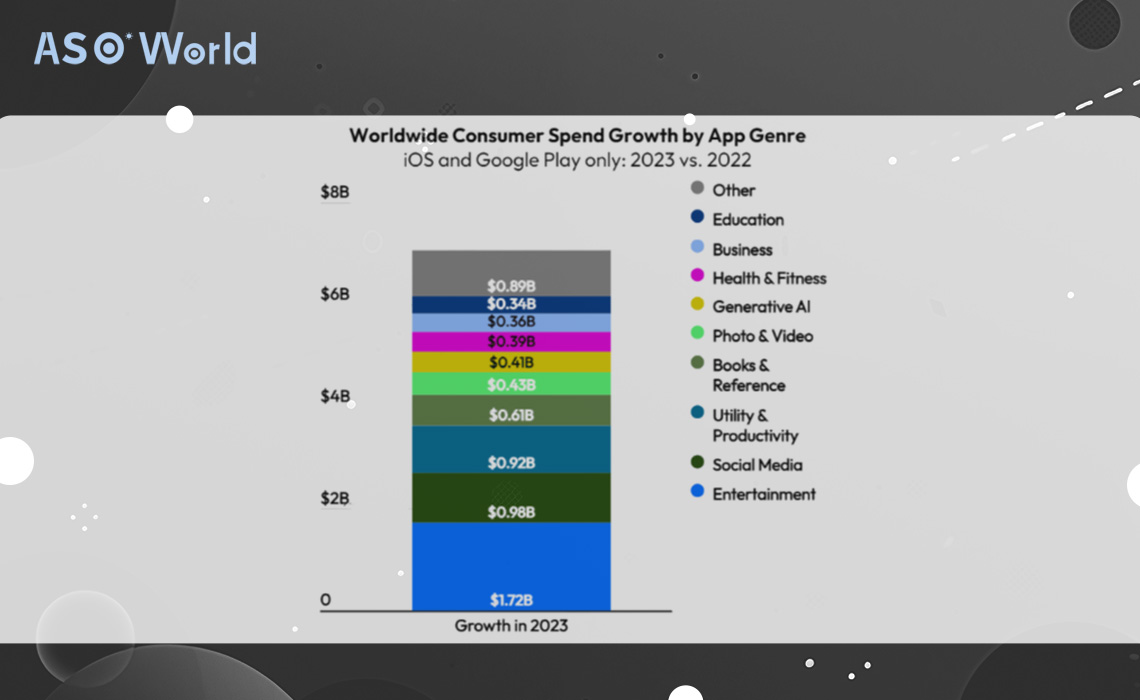
With a 42% year-over-year growth, VPN services and web accelerators are at the forefront of the utility & productivity category , particularly in key markets like India and the United States. This surge underscores a growing consumer emphasis on privacy and online security.
⚡ Utility App Marketing Solutions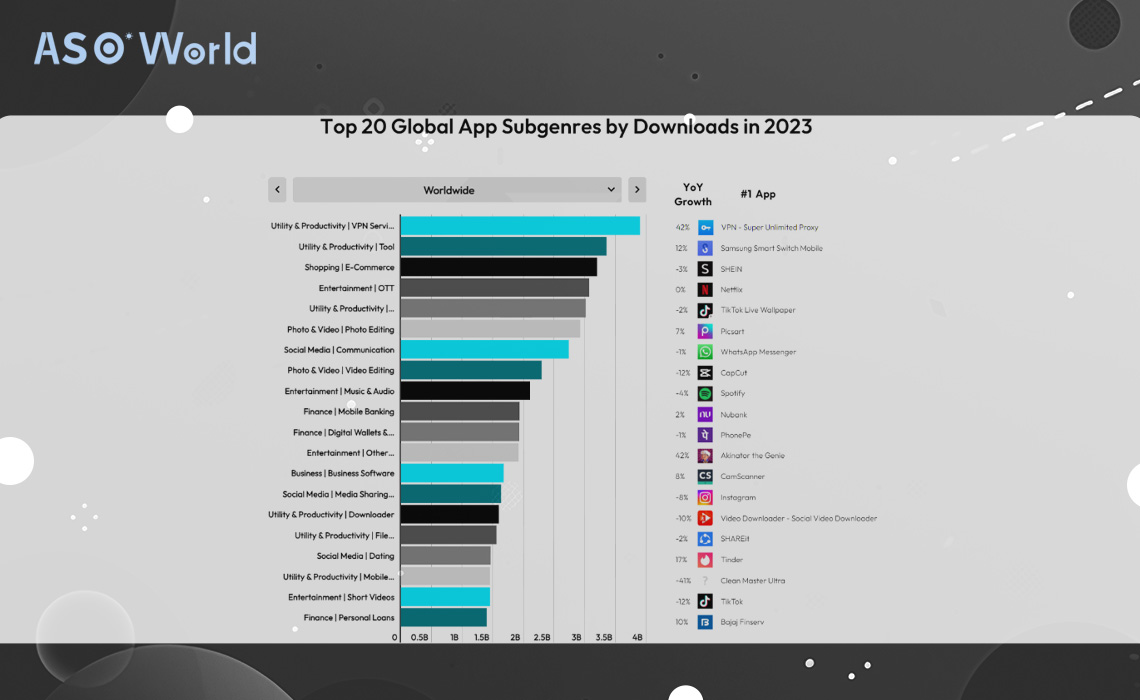
The e-commerce sector has solidified its place as a top contender in the app download space, while Over-the-Top (OTT) services lead in consumer spend. This reflects a shift in consumer behavior towards mobile-first shopping experiences and a preference for digital streaming services.
In 2023, video streaming continued to dominate the mobile app market. OTT services, short videos, video sharing, and live sports apps all witnessed double-digit growth compared to the previous year. This trend highlights the consumer's growing appetite for video content on mobile devices.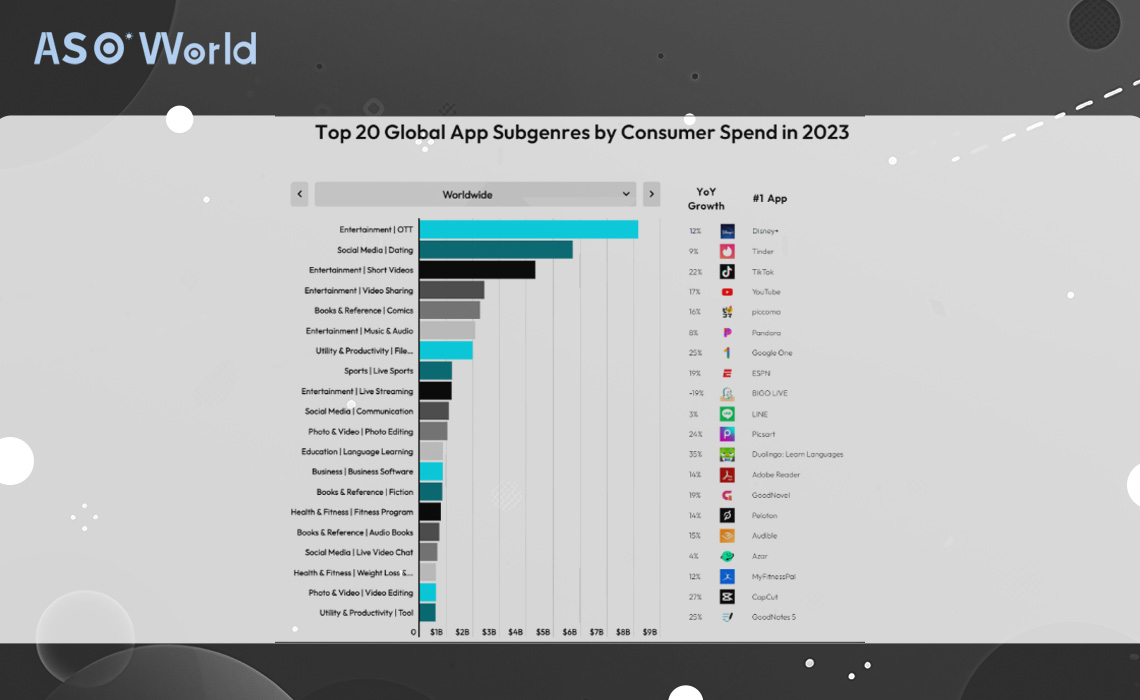
A significant portion of mobile app time is monopolized by entertainment and social media, with four out of the top five subgenres belonging to these categories. This dominance illustrates the central role these apps play in the daily digital routines of users worldwide.
Media sharing platforms, including heavyweights like Instagram and Snapchat, have experienced the most substantial growth, at 35% year-over-year. This growth demonstrates the user's preference for platforms that enable content creation and sharing, further cementing the importance of interactive and engaging content in capturing user attention.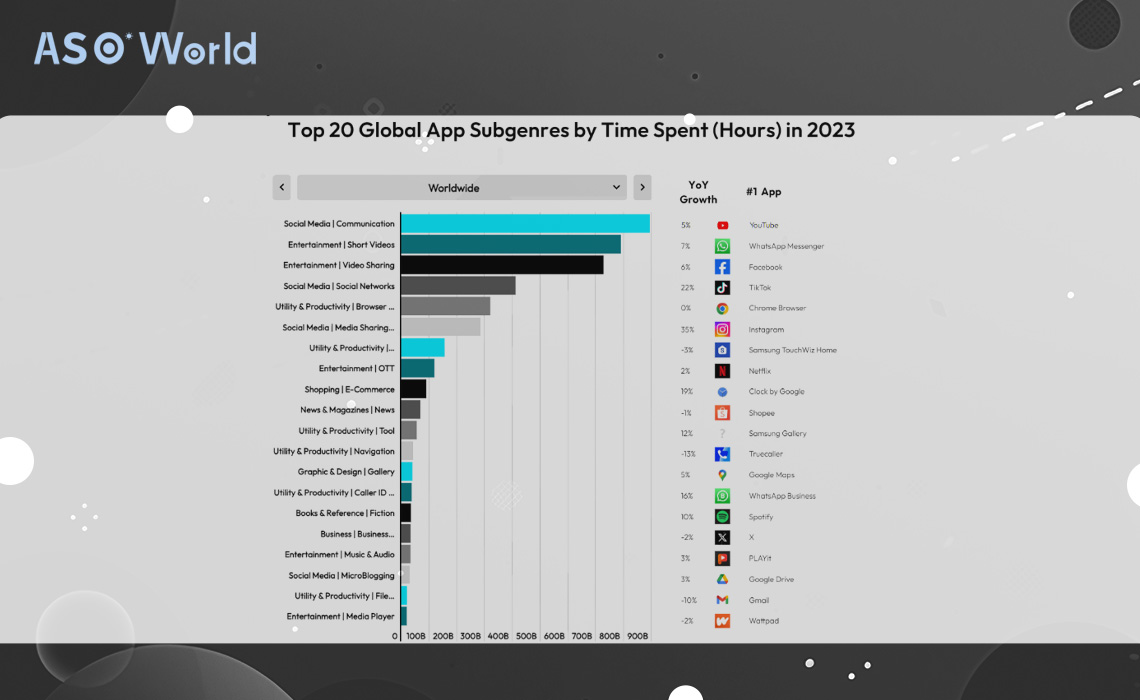
Despite some subgenres experiencing a decline, the app market as a whole has seen robust growth. This is evidenced by the significant number of apps and games generating substantial revenue, with more than 1,500 titles earning over 10 million annually in 2023. Among these,219 surpassed the 100 million mark, and 13 exceeded $1 billion.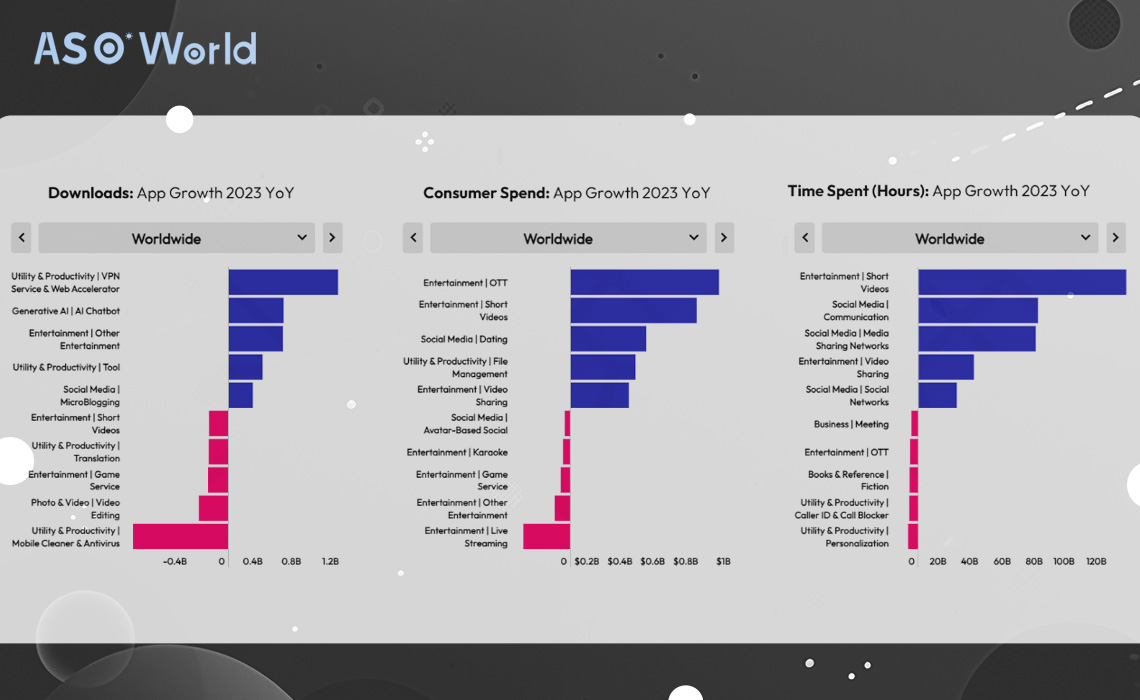
The billion-dollar club has welcomed new entrants, reflecting the dynamism of the mobile app market. Among these newcomers are apps that have capitalized on the latest technology trends, such as augmented reality (AR), artificial intelligence (AI), and blockchain. These apps not only demonstrate the potential for high revenue but also the consumer's appetite for innovative and immersive experiences.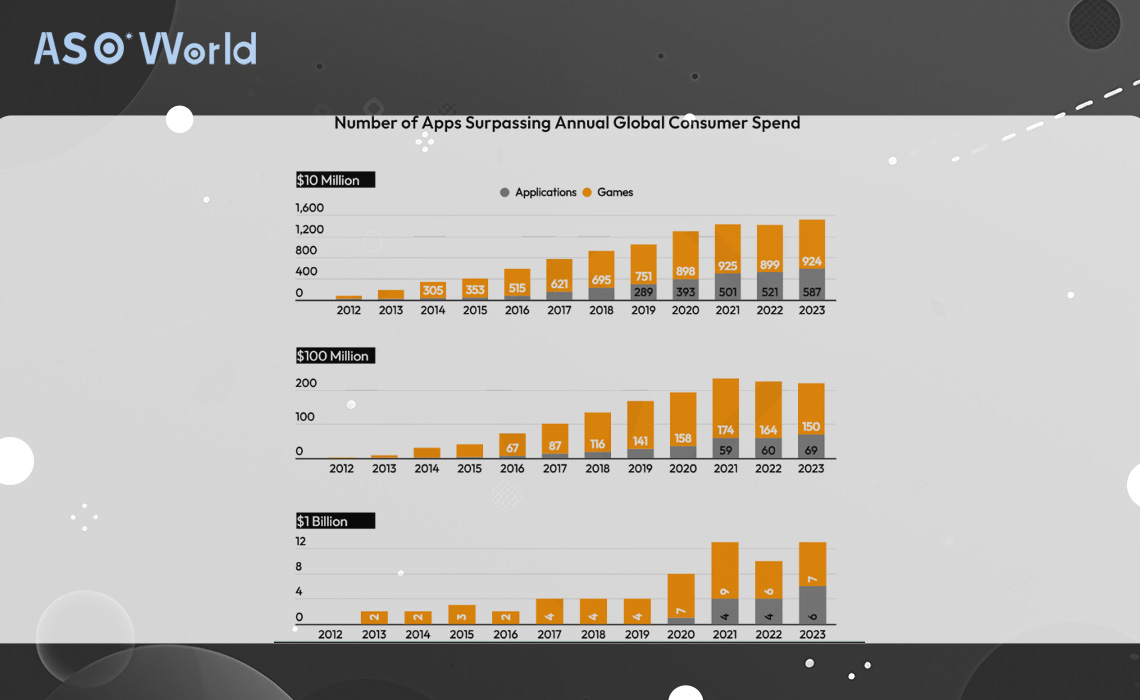
As we look to the future, technologies like 5G, machine learning, and edge computing are expected to further transform the mobile app landscape. These advancements will likely enable more sophisticated and resource-intensive applications, potentially opening up new avenues for revenue and user engagement.
The continuous evolution of consumer needs and technological capabilities will likely give rise to new app categories.
Health and wellness apps, for instance, are projected to gain significant traction as users become more health-conscious and as wearable technology becomes more prevalent. Mental health and meditation apps are already seeing a surge in popularity, indicating a broader trend towards holistic well-being.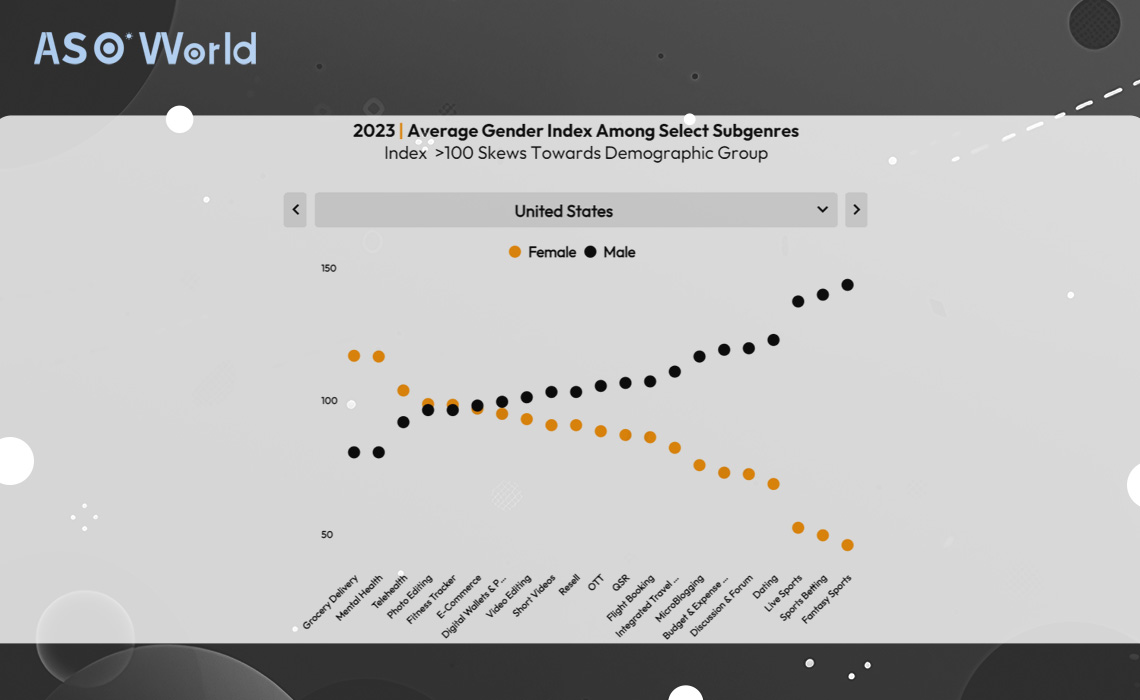
Augmented reality (AR) and virtual reality (VR) are set to redefine the user experience in gaming, education, and social networking. As hardware becomes more accessible and content more rich, these immersive technologies may become standard features in many apps, further blurring the lines between the digital and physical worlds.
⚡ A New Reality Unveiled: VR and AR Transforming Mobile Marketing
Mobile commerce will continue to expand as retailers refine their apps to offer more personalized and seamless shopping experiences. This includes the integration of AR for virtual try-ons, AI for personalized recommendations, and enhanced payment security to build consumer trust.
AI is expected to play a crucial role in personalizing user experiences, with algorithms fine-tuning content delivery to match individual preferences and behaviors. Automation within apps, powered by AI, can streamline tasks, predict user needs, and offer timely assistance or recommendations, thereby increasing efficiency and user satisfaction.
⚡ AI App Marketing Solutions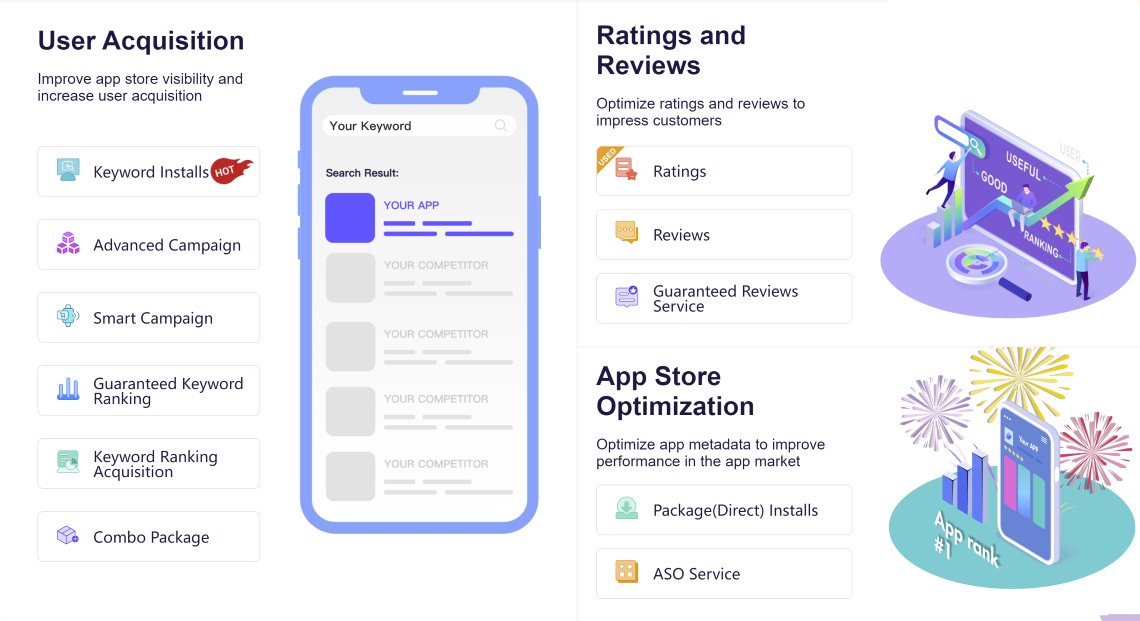
* Grow with our app growth solutions - choose a Guaranteed Keyword Ranking Service for the TOP 5 app ranking acquirement, and maximize your app traffic. Or click the image above (to increase app installs service for app visibility).
As the Internet of Things (IoT) expands, apps that work seamlessly across multiple devices and platforms will become more prevalent. This synergy will allow users to start a task on one device and finish it on another, creating a cohesive ecosystem that enhances convenience and user experience.
With increasing awareness of environmental and ethical concerns, sustainable app development practices will become more significant.
Developers will be expected to create apps that not only minimize environmental impact but also promote ethical usage patterns, protect user privacy, and ensure data security. This shift will likely lead to the adoption of green coding practices, energy-efficient app designs, and transparent data policies that align with global sustainability goals and ethical standards.
Blockchain technology is poised to give rise to decentralized apps (dApps) that operate on a peer-to-peer network rather than being hosted on centralized servers. These apps offer advantages in terms of data integrity, security, and resistance to censorship. As blockchain technology matures, we can expect a broader adoption of dApps across various sectors, including finance, social media, and governance.
As cyber threats evolve, mobile apps will need to implement more robust security measures to protect user data. This could include advanced encryption techniques, biometric authentication, and real-time security monitoring. Developers and companies will likely place a greater emphasis on security to maintain user trust and comply with regulatory requirements.
The mobile app industry is on the cusp of further transformative changes, driven by technological advancements and shifting user expectations. As the digital landscape evolves, app developers and businesses will need to stay agile and forward-thinking to capitalize on emerging opportunities and address the challenges of a rapidly changing market.
Innovation will be key, not only in terms of technological integration but also in creating value for users and fostering a sustainable, secure, and ethical digital environment.
Click "Learn More" to drive your apps & games business with the ASO World app promotion service now.

Get FREE Optimization Consultation
Let's Grow Your App & Get Massive Traffic!
All content, layout and frame code of all ASOWorld blog sections belong to the original content and technical team, all reproduction and references need to indicate the source and link in the obvious position, otherwise legal responsibility will be pursued.